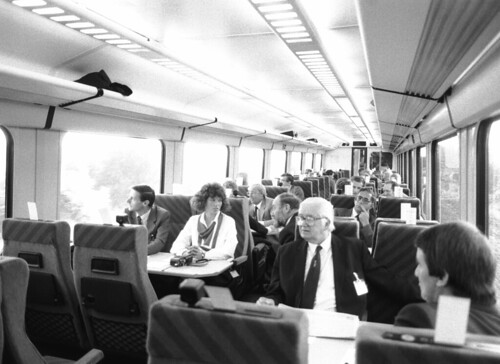There is now discussion in the railway press about returning the redundant Irish mark 3 stock to Britain. This could add up to 130 vehicles to the fleet, including the magnificent large-windowed International set. (above)
The problems, apparently, are that they have a different electrical system and the bogies need to be modified or changed for the different gauge, but with new vehicles costing upwards of £2.5 million, they suddenly look like a bargain.

Kommentarer
The origin of the British (and now Irish) obsession with DMU/EMUs is something of mystery to me. (The only other country I know of that does something similar is Japan). I wonder if this relates somehow to the battles over staffing levels on BR decades ago.
I think there's a place for EMU's (eg underground sytems) but go to europe and try to find DMUs - they are rare (but exist increasingly) Are we ahead of the game?
Returning to one of your previous points about vehicle lifes - the V160 Class in Germany started to be built in ~1962 and a few (not many are still in action) over 500 were built over more than a decade (with improvements) - excluding shunters there were essentially no other diesel locomotives on the system. (for comparison they had the same power as a class 37 but BoBo wheels and hydraulic transmission)
In the electric field the E10 (over 500 built in the 50s and 60s) lasted till the 2000s (just), the E40 (over 800 built ~1960s) are still in work but being replaced by the likes of TRAXX. Add to this the East German locos: two types of electric and one diesel (DR243 DR 250 DR130 et al : ~600,>250,~800 built)
All this adds to an impression of a near monoculture (excluding some express locos I've omitted) - compare this to the proliferation of types brought about by BR's dieselisation - some of which were bad, indifferent of just non-standard; others turned out to be good.. Also compare (and weep) with the virtually non-existance electric fleet.
The other main point is the dominance of electric traction : one undercurrent reason for building HS2 is the argument "the french and japanese have them - so should we.." - In my opinion it's a real national disgrace that the midland, transpennine (leeds-manchester), and western (bristol cardiff) mainlines are not electrified - this should have happened decades ago, not high speed rail.
(It's a British hobby to compare with the Germans - but the French hadn't ordered a new diesel locomotive for 30 years when they decided on new BB75000s in the year 2000) - again compare this with the constant ordering and scrapping of deltics, class 50s,56s,58s, etc...)
On the subject of electricity the (controversial) River Severn barrage would also cost 20bn - but would produce quantifyable results - ie measurable amounts of electricity. Similarly offshore (and on shore windfarms - what use are the pennines?) cost similar amounts - but are now being dithered-over due to the economic downturn.. but HS2 remains a political priority. It's easy to say this is the same as buying a golden bowl and then starving to death.
Back to the original point - I believe the DMU/EMU obsession results from a desire to cut manpower costs rather than engineering/maintenence costs (I'm sure having one engine/transmission per car is more expensive to service than one per train) - ie it may be a result of the workforce/union/management battles that shadowed british industry throughout the 20th century - can anyone shed any light on this.?
I wonder if the question of unit trains versus loco-powered push-pull is even thought about in Britain, multiple unit seems to have become the default choice. It lacks flexibility and 9-car DMUs with each car powered are a nonsense.
Labour costs are high in Europe because of the way the tax system works, and that is also a nonsense as you end up with low pay and high wage costs at one and the same time. That tends to lead to too much being spend on hardware when extra staff would be cheaper if it wasn't for the way the tax system works by hitting employers.
I've no experience of double decker trains at all - and they're not likely in this country soon - I've seen no mention of them in any HS2 proposal? I'd be interested to hear your views or experience of them if you have any.